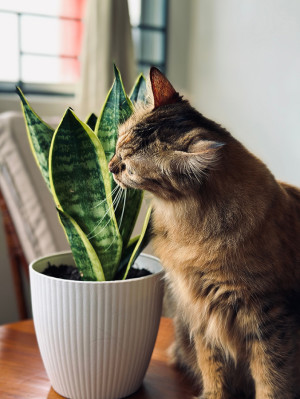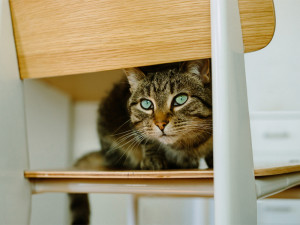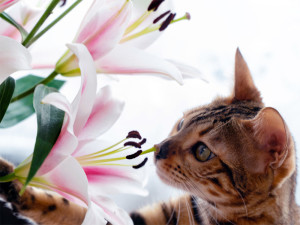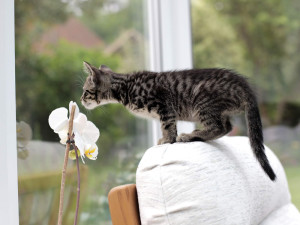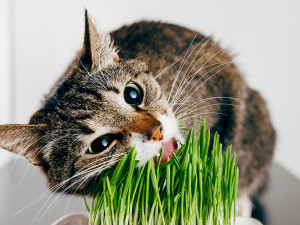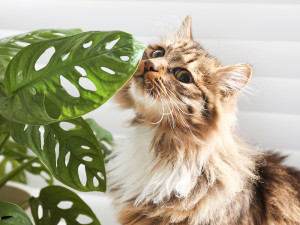Are Hibiscus Flowers Toxic to Cats?
They’re pretty to look at, but can your cat be an admirer?

Share Article
Who doesn’t love a refreshing sip of hibiscus tea or the added luxury of a hibiscus flower garnish? Hibiscus is a popular addition to gardens, bouquets, and culinary dishes, but is it safe for your cat? Hibiscus is typically considered to be non-toxic to cats, but that doesn’t mean cats can eat hibiscus without any ill effects. Let’s discuss.
Hibiscus, and especially hibiscus tea, is wildly popular for its tart flavor, low-calorie and caffeine-free status, and potential health benefits. Hibiscus contains large amounts of polyphenols, a group of chemicals with antioxidant properties. Potential health benefits of hibiscus tea include lowering blood pressure, blood sugar, and bad cholesterol levels. (Random fact: having a cat can help improve your health too).
There are well over 100 varieties of hibiscus plant, but popular ones include:
Roselle (Hibiscus sabdariffa): The roselle variety of hibiscus is most commonly used to make hibiscus tea. Research regarding the health benefits of hibiscus tea refers to this variety.
Chinese hibiscus (Hibiscus rosa-sinensis): This versatile variety is used for gardening and to make hibiscus tea, but evidence of its potential health benefits is limited.
Rose of Sharon hibiscus (Hibiscus syriacus): Rose of Sharon hibiscus is a popular option for home gardens.
Identifying plants by their common names can lead to some confusion, and hibiscus is no different. Pet parents should note that Hypericum calycinum, also called St. John’s wort or Klamath weed, is sometimes referred to as “rose of Sharon.” These plants should be differentiated from hibiscus because Hypericum calycinum plants contain hypercinin, a toxin that is known to cause contact dermatitis and sun sensitivity in cats, dogs, livestock, and people.

Can cats eat hibiscus?
Hibiscus does not contain toxic chemicals or compounds and is generally considered to be non-toxic to cats. This does not mean that hibiscus is completely safe for cats to eat, though. Some cats will develop mild to moderate gastrointestinal upset after eating hibiscus.
Hibiscus plants do not provide any health benefits for cats. The best bet is to block access to hibiscus and not risk any preventable vomiting or diarrhea. Do not feed cats any part of a hibiscus plant, even the cute flowery garnishes from your plate.
What should I do if my cat has eaten hibiscus?
If your cat eats hibiscus, immediately remove the plant or block off access so that your cat can’t continue to nibble on the plant. Keep a watchful eye on your cat for the development of gastrointestinal signs. Pay attention to the amount of hibiscus your cat ingested. The more they eat, the more likely they are to develop symptoms. If your cat develops symptoms, contact your veterinarian.
If you know that the plant was recently treated with fertilizer or pesticides, gather information about the product and contact your vet or animal poison control for guidance. Being able to provide product names and active ingredients speeds up the process of determining if your cat needs medical intervention.
Diagnosing plant poisoning in cats
A cat’s curious nature often leads them to get into things they shouldn’t, including plants. The most definitive way to diagnose plant poisoning in cats is to actually witness a cat eating the plant. However, cat parents may strongly suspect plant ingestion as the cause for their cat’s symptoms after finding disturbed soil or nibble marks in leaves or flowers.
Symptoms of hibiscus plant poisoning in cats
Cats that ingest hibiscus may develop mild to moderate gastrointestinal upset. Not all cats develop symptoms, and some cats can take nibbles of hibiscus plants without any ill effects. A cat that eats a large amount of hibiscus is more likely to develop symptoms. Symptoms of hibiscus plant poisoning in cats include:
Nausea
Drooling
Vomiting
Diarrhea
Treatment for hibiscus poisoning in cats
Cats being treated for hibiscus poisoning should respond well to symptomatic care. Your veterinarian may recommend anti-nausea medication, anti-diarrhea medications, or fluid therapy to restore hydration. Cats typically recover quickly with outpatient care. A cat with persistent symptoms may need more aggressive care if they become too dehydrated.
How to prevent plant poisoning in cats?
The best way to prevent plant poisoning in cats is to avoid bringing toxic plants inside your home. Keeping your cat indoors eliminates the possibility of them looking for snacks in outdoor gardens with toxic plants. Cat parents who enjoy the ambiance that houseplants and flowers add to the home should be vigilant about only keeping pet-safe varieties of plants. Check the species of any gifted plants or bouquets before placing them in a location where your cat can reach them.
The bottom line: Is hibiscus poisonous to my cat?
Hibiscus does not contain any toxic compounds or chemicals and is generally considered to be non-toxic to cats. However, some cats will experience mild to moderate gastrointestinal signs like vomiting or diarrhea after eating hibiscus. There’s no evidence suggesting that one part of the plant is more harmful than another, but the more hibiscus a cat eats, the more likely the cat is to develop symptoms. Although there are many varieties of hibiscus, the Rose of Sharon variety, Hibiscus syriacus, may be more likely to cause symptoms in cats.
Other flowers that are safe for cats
Orchid (Phalaenopsis sp.): Commonly called moon or moth orchids, these dainty flowers are popular in bouquets or as houseplants. Orchids also have the added benefit of being pet-friendly.
Zinnia (Zinnia elegans): Zinnias can be a great addition to any garden, adding bold colors like pink, orange, and yellow. They’re not only feline-friendly, but zinnias also attract pollinators. They’re a known favorite of butterflies.
Snapdragon (Antirrhinum majus): Snapdragons are popular, cat-safe flowers that thrive during the cooler seasons. The florets’ resemblance to a dragon’s snout gives snapdragons their cute name.
Other flowers that are dangerous for cats
Lily (Lilium spp.): Lilies are popular flowers to include in bouquets, but are also attractive to many cats. True lilies, including tiger lilies, stargazer lilies, daylilies, and Easter lilies, are highly toxic to cats. Ingestion of any part of the plant (even the pollen) can cause kidney failure in cats. Be sure to keep your cat safe from lilies.
Daffodils (Narcissus spp.): Daffodils are cheery, sun-loving flowers, but they are also toxic to cats. Cats that eat any part of a daffodil (but especially the bulb) can develop vomiting, diarrhea, tremors, abnormal heart rhythms, and seizures.
Bird of Paradise (Strelitzia reginae): This tropical flower can cause gastrointestinal upset and lethargy in cats, with the toxin being most concentrated in the fruit and seeds. Cat parents should also be aware of Caesalpinia pulcherrima, commonly called a red bird of paradise or peacock flower. This similarly named flower can also cause vomiting and diarrhea in cats.
FAQS (People also ask):
What happens if my cat eats hibiscus?
Many cats can eat small amounts of hibiscus plant without any ill effect. However, some cats will experience mild to moderate gastrointestinal upset and develop nausea, vomiting, or diarrhea.
Can cats eat hibiscus flowers?
Eating a hibiscus flower is just as likely to cause symptoms in cats as any other part of the plant. There’s no evidence suggesting that one part is more harmful than another. Cats should not be fed hibiscus flowers due to the risk of developing GI upset.
Are hibiscus plants poisonous to cats if they smell them?
Hibiscus plants are not poisonous to cats if they smell them. Cat parents should keep in mind that if a cat is close enough to sniff hibiscus, they’re close enough to take a bite.
References:

Dr. Alycia Washington, DVM, MS
Alycia Washington is a small-animal emergency veterinarian with over 10 years of experience based in North Carolina. She works as a relief veterinarianopens in new tab and provides services to numerous emergency and specialty hospitals. She also works as a veterinary writer with a focus on educating pet parents.
Related articles
Are Petunias Toxic to Cats?
If your kitty is poking exploring your garden, this flower isn’t much of a danger. Here’s why.
![Cat chewing on cat grass]()
The 10 Best Non-Toxic House Plants for Cats
Cats love the crunch of a houseplant. These will do them no harm.
![Plant Kween standing in a greenhouse space wearing brightly colored pants and a beige corset top smiling in a carefree way]()
The Plant Kween Has Spoken!
We’ve got the fabulous gardener’s take on pet-friendly plants.
Are Carnations Toxic to Cats?
If you receive this flower in a bouquet, keep it away from your cat.
Are Daisies Toxic to My Cat?
They’re cute in the garden, not so much for your cat. Here’s why.
![cat sniffing a plant]()
Household Plants That Are Toxic to Cats
These plants might be beautiful, but they’re deadly to feline foragers.

